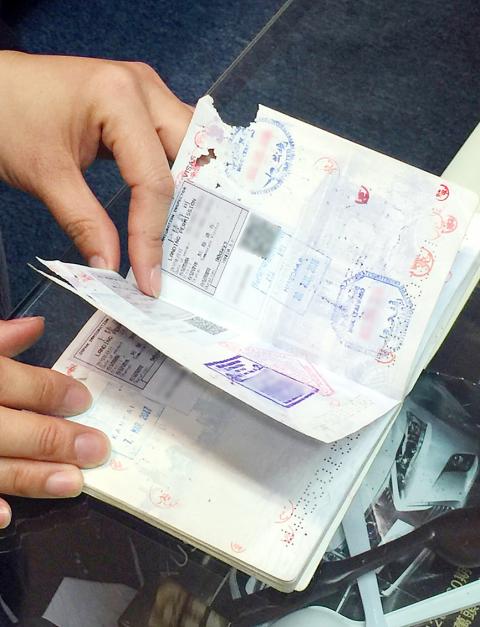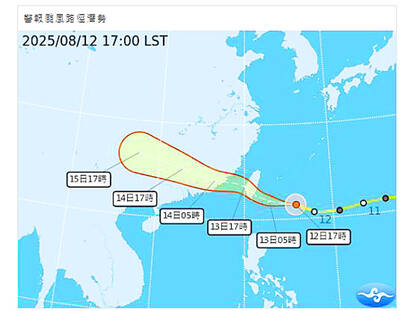The Ministry of Foreign Affairs yesterday downplayed an incident in which a Taiwanese woman was detained for 35 hours by Malaysian customs for traveling with a damaged passport, saying the practice is standard procedure.
The woman, nicknamed Chiao Mei (喬妹), took to Facebook on Saturday last week to share her ordeal, saying that because of some damaged inner pages of her passport she was denied entry and subjected to improper treatment by Malaysian customs after she arrived at Kuala Lumpur International Airport on Thursday last week.
“Those pages were torn by Japanese customs when they tried to rip off tax free forms stapled in my passport. Because of that, Malaysian customs officers gave me a hard time, escorting me to an office before confiscating my passport and mobile phone,” Chiao Mei wrote.

Photo: CNA
She claimed that a male officer also demanded money from her, adding that her refusal to comply resulted in her being locked up for 35 hours before she was finally deported to Taiwan.
Citing as examples of what she called the Malaysian customs’ inhumane treatment of tourists, Chiao Mai said another Taiwanese woman was also detained because she mistakenly showed customs officers the plane ticket from her previous trip to Malaysia, while a Vietnamese woman was slapped in the face by an official over a minor incident.
In response, the ministry said it is part of the standard procedures for Malaysian customs to put tourists who are denied entry in a holding lounge if they cannot board a flight back home on the day of their arrival.
“Nearly 1.5 million passengers pass through Kuala Lumpur International Airport each month. Among them, as many as between 10 and 100 are denied entry every day,” the ministry said, adding that the Malaysian customs’ handling of Chiao Mei was standard procedure rather than personal.
It urged the public to check for any damage to their passport before traveling to avoid being refused admission at the point of entry.
Dato’ Seri Tiong King Sing, the Malaysian prime minister’s special envoy to East Asia, yesterday said on Facebook that Malaysian Deputy Prime Minister Ahmad Zahid Hamidi was furious after hearing about the incident because it could damage the nation’s image and hurt the tourism industry.
He issued a directive for an investigation into the case.
The Taiwanese traveler should not have been detained and should not have had her mobile phone and other belongings confiscated because she was not a criminal, Tiong said, adding that customs officers should not treat passengers from any nations in such an inhumane manner.
In this case, customs officers should have let the Taiwanese woman telephone a friend in Malaysia, contact Taiwan’s representative office or have arranged for her to return to Taiwan as soon as possible, he said.
Additional reporting by CNA

DEFENSE: The first set of three NASAMS that were previously purchased is expected to be delivered by the end of this year and deployed near the capital, sources said Taiwan plans to procure 28 more sets of M-142 High Mobility Artillery Rocket Systems (HIMARS), as well as nine additional sets of National Advanced Surface-to-Air Missile Systems (NASAMS), military sources said yesterday. Taiwan had previously purchased 29 HIMARS launchers from the US and received the first 11 last year. Once the planned purchases are completed and delivered, Taiwan would have 57 sets of HIMARS. The army has also increased the number of MGM-140 Army Tactical Missile Systems (ATACMS) purchased from 64 to 84, the sources added. Each HIMARS launch pod can carry six Guided Multiple Launch Rocket Systems, capable of

Tropical Storm Podul strengthened into a typhoon at 8pm yesterday, the Central Weather Administration (CWA) said, with a sea warning to be issued late last night or early this morning. As of 8pm, the typhoon was 1,020km east of Oluanpi (鵝鑾鼻), Taiwan’s southernmost tip, moving west at 23kph. The storm carried maximum sustained winds of 119kph and gusts reaching 155kph, the CWA said. Based on the tropical storm’s trajectory, a land warning could be issued any time from midday today, it added. CWA forecaster Chang Chun-yao (張竣堯) said Podul is a fast-moving storm that is forecast to bring its heaviest rainfall and strongest

GET TO SAFETY: Authorities were scrambling to evacuate nearly 700 people in Hualien County to prepare for overflow from a natural dam formed by a previous typhoon Typhoon Podul yesterday intensified and accelerated as it neared Taiwan, with the impact expected to be felt overnight, the Central Weather Administration (CWA) said, while the Directorate-General of Personnel Administration announced that schools and government offices in most areas of southern and eastern Taiwan would be closed today. The affected regions are Tainan, Kaohsiung and Chiayi City, and Yunlin, Chiayi, Pingtung, Hualien and Taitung counties, as well as the outlying Penghu County. As of 10pm last night, the storm was about 370km east-southeast of Taitung County, moving west-northwest at 27kph, CWA data showed. With a radius of 120km, Podul is carrying maximum sustained

TRAJECTORY: The severe tropical storm is predicted to be closest to Taiwan on Wednesday and Thursday, and would influence the nation to varying degrees, a forecaster said The Central Weather Administration (CWA) yesterday said it would likely issue a sea warning for Tropical Storm Podul tomorrow morning and a land warning that evening at the earliest. CWA forecaster Lin Ting-yi (林定宜) said the severe tropical storm is predicted to be closest to Taiwan on Wednesday and Thursday. As of 2pm yesterday, the storm was moving west at 21kph and packing sustained winds of 108kph and gusts of up to 136.8kph, the CWA said. Lin said that the tropical storm was about 1,710km east of Oluanpi (鵝鑾鼻), Taiwan’s southernmost tip, with two possible trajectories over the next one